An Exciting Job[上学期]
图片预览
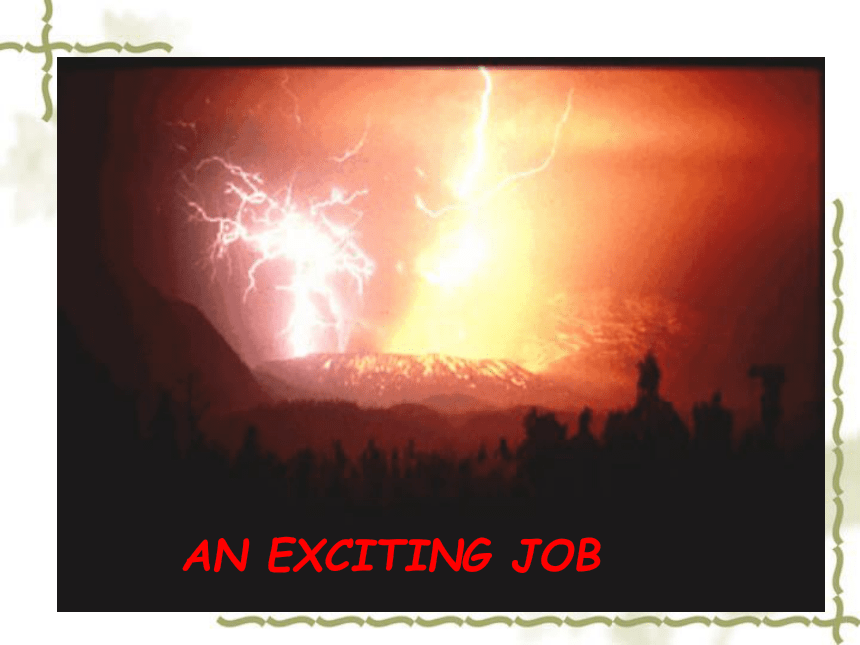
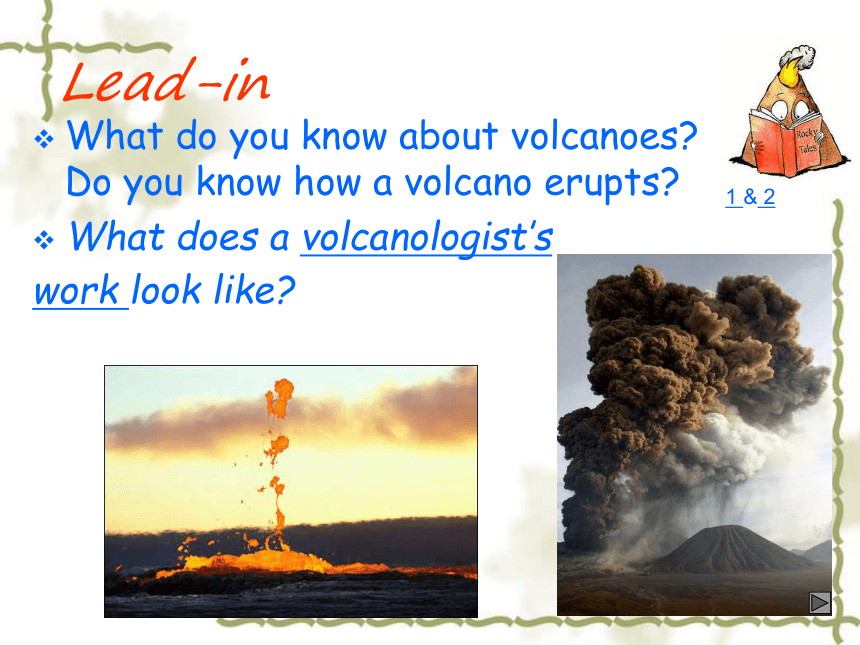
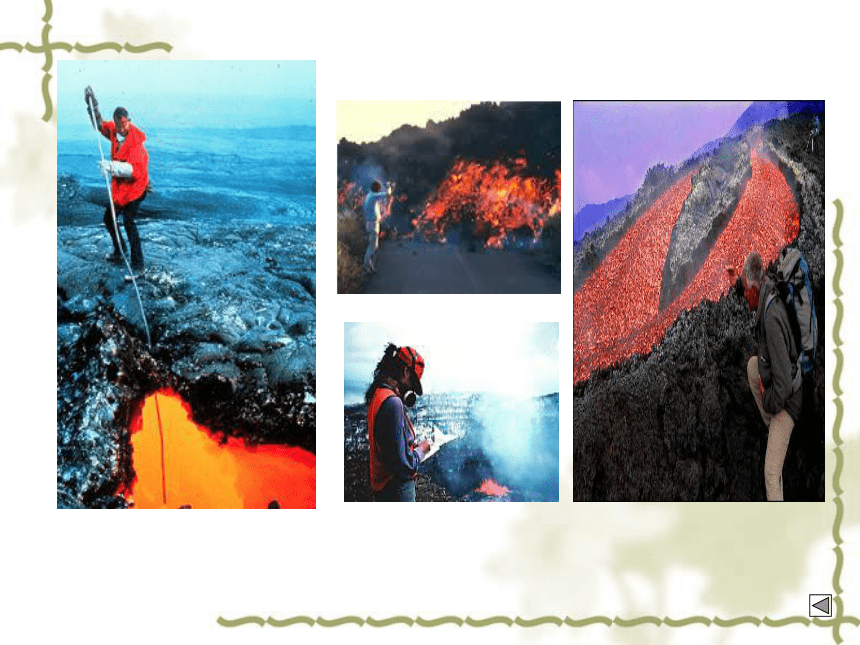
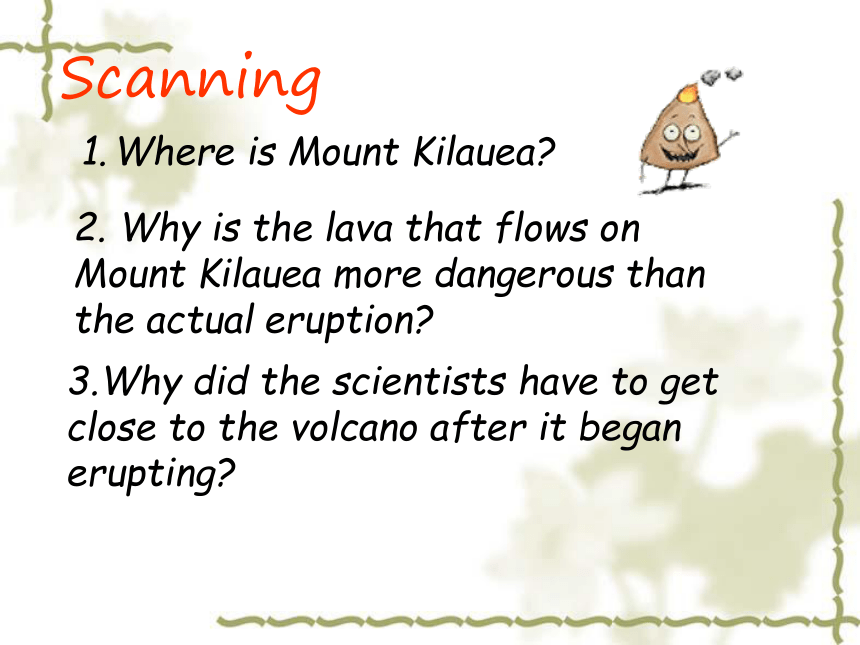
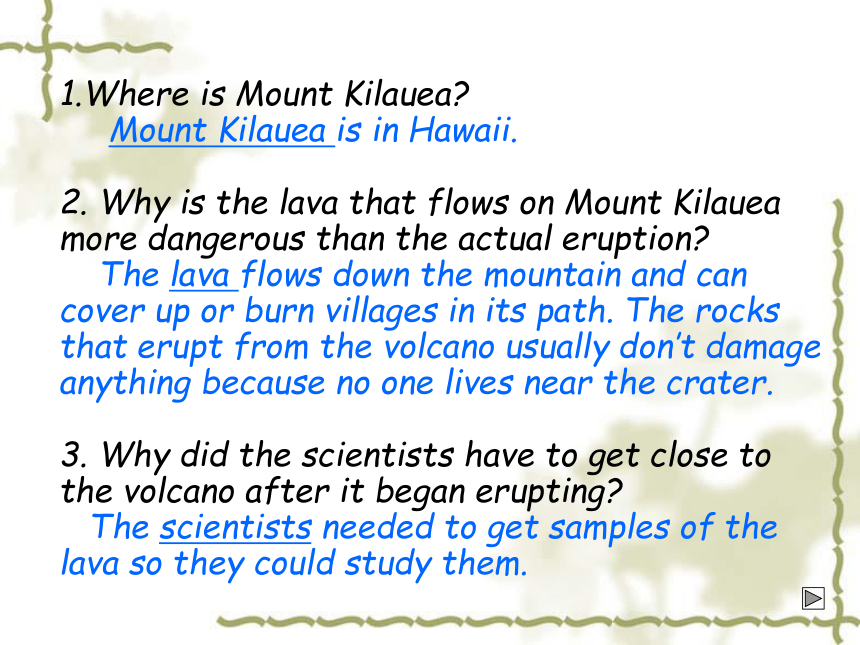
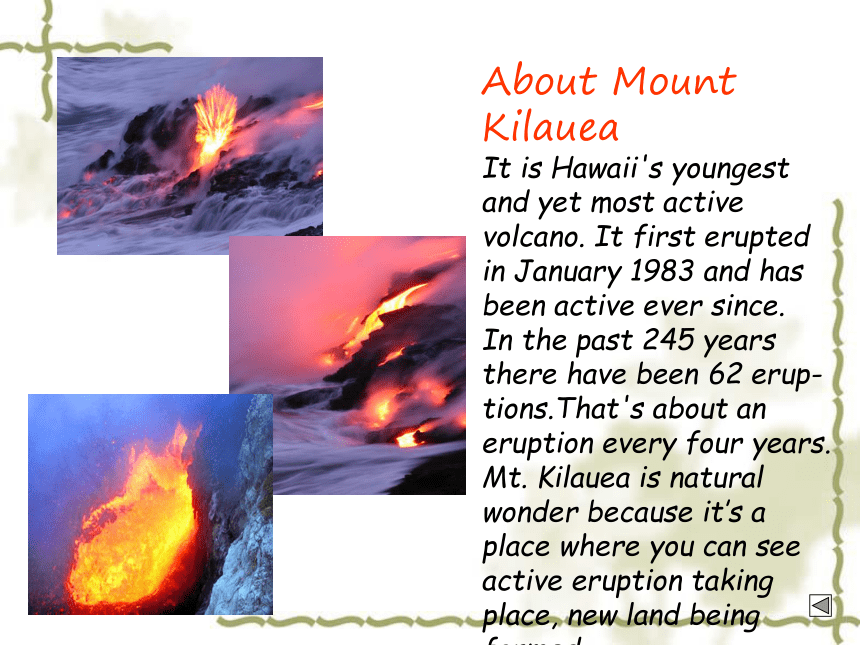
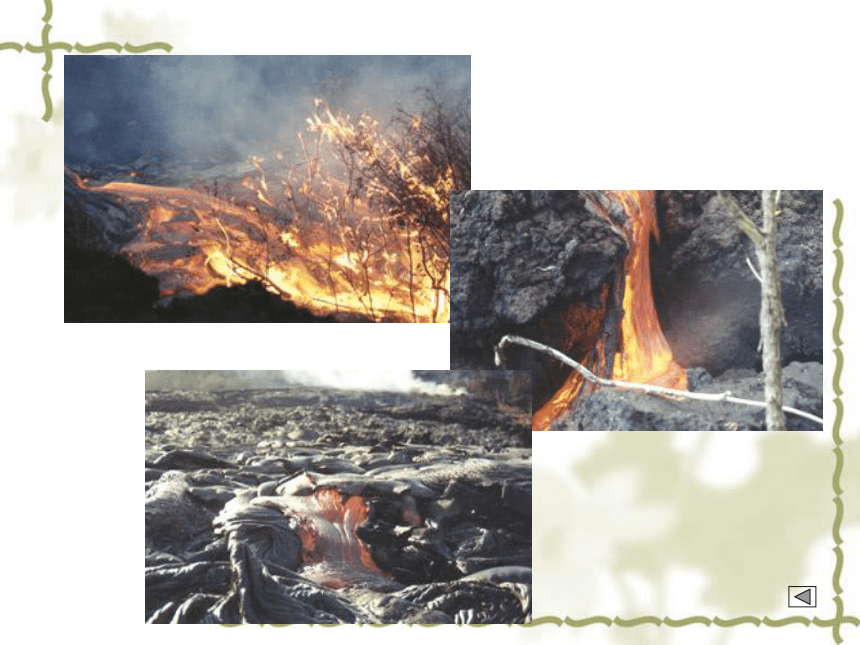
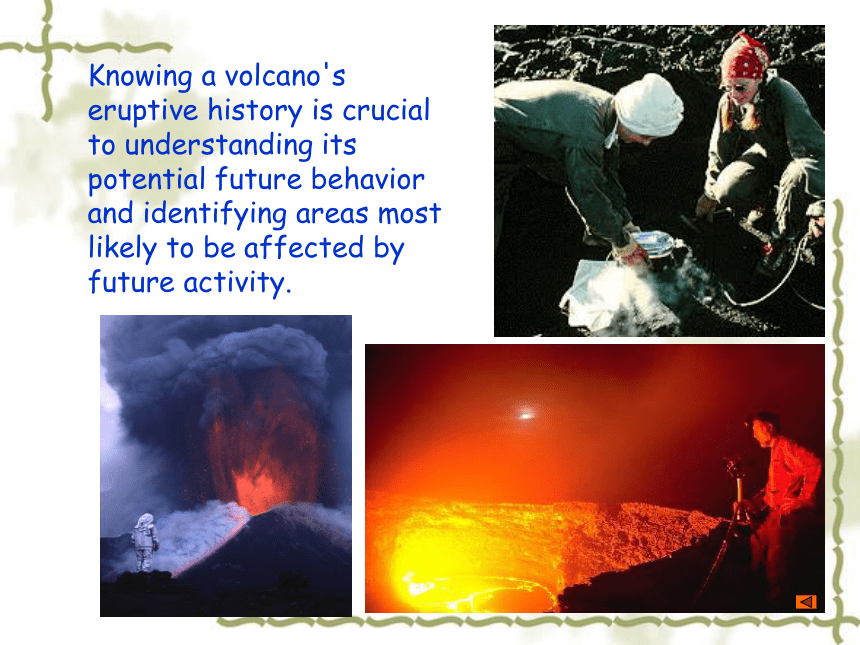
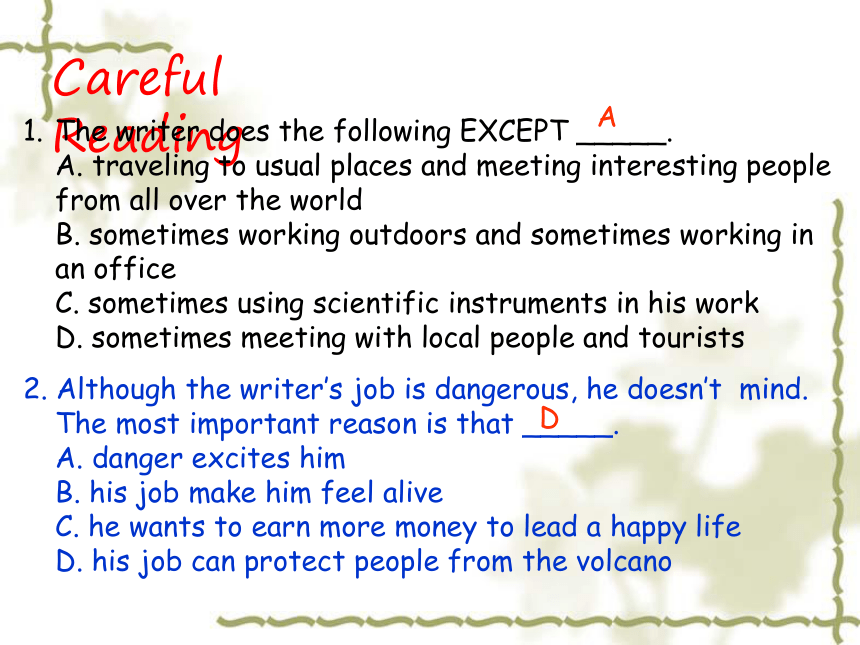
文档简介
课件20张PPT。AN EXCITING JOBWhat do you know about volcanoes? Do you know how a volcano erupts?
What does a volcanologist’s
work look like?
1 & 2Lead-inScanningWhere is Mount Kilauea?2. Why is the lava that flows on Mount Kilauea more dangerous than the actual eruption?3.Why did the scientists have to get close to the volcano after it began erupting?1.Where is Mount Kilauea?
Mount Kilauea is in Hawaii.
2. Why is the lava that flows on Mount Kilauea more dangerous than the actual eruption?
The lava flows down the mountain and can cover up or burn villages in its path. The rocks that erupt from the volcano usually don’t damage anything because no one lives near the crater.
3. Why did the scientists have to get close to the volcano after it began erupting? The scientists needed to get samples of the lava so they could study them.About Mount Kilauea It is Hawaii's youngest and yet most active volcano. It first erupted in January 1983 and has been active ever since. In the past 245 years there have been 62 erup-tions.That's about an eruption every four years. Mt. Kilauea is natural wonder because it’s a place where you can see active eruption taking place, new land being formed.Knowing a volcano's eruptive history is crucial to understanding its potential future behavior and identifying areas most likely to be affected by future activity.Careful ReadingThe writer does the following EXCEPT _____. A. traveling to usual places and meeting interesting people from all over the world B. sometimes working outdoors and sometimes working in an office C. sometimes using scientific instruments in his work D. sometimes meeting with local people and tourists
2. Although the writer’s job is dangerous, he doesn’t mind. The most important reason is that _____. A. danger excites him B. his job make him feel alive C. he wants to earn more money to lead a happy life D. his job can protect people from the volcanoAD3. The writer works for HVO, and his main job is _______. A. collecting and evaluating the information about Hawaii B. collecting information about Mount Kilauea C.predicting where lava from the volcano will flow next D. saving lives when the volcano erupts 4. Boiling rocks erupting from the volcano and crashing back to earth cause less damage than you might imagine because____. A. the lava flows slowly down the mountain B. no one lives near the top of the mountain where the rocks fall C. people run as fast as possible D. people have already known the eruption of the volcano BB5. When the writer and two other scientists put on their special clothes, they ______. A. couldn’t get close to edge of the crater B. only covered their feet and heads C. slowly made their way to the edge of the crater D.could walk easily and freelyC The Hawaiian Volcano Observatory (HVO) enjoys a world-wide reputation as a leader in the study of active volcanism. It was established in 1912 by Dr. Thomas Jaggar of the Massachusetts Institute of Technology. The original observatory was at the present location of the Volcano House. The observatory was moved to Uwekahuna Bluff, the highest point on the caldera rim, in 1916, when the national park was created.Organization
Part 1(Para.1 - Para.2)
Part 2(Para.3 – Para.4)
Part 3(Para. 5)
What is the writer’s job and the importance
of his job.The writer’s experience of watching the volcano eruption.
The reasons why the writer is enthusiastic
about his job. Summary I have the greatest job in the world. My main job is _________________ about Mount Kilauea. I’ll never forget my first sight of an _______. I was fast asleep when suddenly my bed began ______ and I heard a strange sound, like a railway train ____________________. I was _____________to sleep ____suddenly my bedroom became ____________. There _______an eruption and red hot lava was _________ hundreds of meters ________. It was an _______________ sight. ___________ volcanoes now for more than twenty years, I am still ________their beauty as well as their _______ to cause great damage.collecting informationeruptionshaking passing outside my windowabout to go back when as bright as dayhad been fountaining into the airabsolutely fantasticHaving studied amazed atpotentialDiscussion 1.Do you think a volcanologist’s job is necessary in our daily life? 2. Do volcanoes have a positive or negative effect on society? Monitoring volcanoes and earthquakes to track their behavior before, during, and after eruptions and to determine the nature of their activity. Studying the eruption histories of Hawaii's volcanoes in order to achieve a long-term perspective that can help to anticipate their future behavior and identify potentially hazardous areas. Communicating results of our studies with the public, emergency managers, educators, and students through the media, presentations and workshops, field trips, and the USGS Volunteer Program. Volcanoes both harass and help mankind.1) There are many hazards from volcanic eruptions. The different kinds of hazards can be lava flows, volcanic gases, tsunamis, and many more. The majority of the damage to society from volcanoes is economic, agricultural, and settlements can be ruined. Many communication and transportation systems were disrupted due to the eruptions. The tourist industry was greatly effected immediately following the eruptions .2)Volcanoes help enrich soil for farming and in some cases provide reservoirs for the storage of ground water. Moreover the earth's valuable resources are formed in volcanoes. These elements include zinc, copper, lead, tin, silver, mercury, and gold. Geothermal power is an alternate energy source that is better for the environment and volcanoes provide this to society also. Volcanoes even help us understand past civilizations and cultures. The lava preserves fossils and artifacts that scientists can learn from. Volcanoes are natural wonders that should be appreciated and studied. As a society we need to make the best use of the resources that volcanoes provide for us. There are many negative effects, but there are a few positive ones too. We also need to be careful to limit the hazards of volcanoes as much as possible. Homework
What do you think people should do in face of natural disasters?
What does a volcanologist’s
work look like?
1 & 2Lead-inScanningWhere is Mount Kilauea?2. Why is the lava that flows on Mount Kilauea more dangerous than the actual eruption?3.Why did the scientists have to get close to the volcano after it began erupting?1.Where is Mount Kilauea?
Mount Kilauea is in Hawaii.
2. Why is the lava that flows on Mount Kilauea more dangerous than the actual eruption?
The lava flows down the mountain and can cover up or burn villages in its path. The rocks that erupt from the volcano usually don’t damage anything because no one lives near the crater.
3. Why did the scientists have to get close to the volcano after it began erupting? The scientists needed to get samples of the lava so they could study them.About Mount Kilauea It is Hawaii's youngest and yet most active volcano. It first erupted in January 1983 and has been active ever since. In the past 245 years there have been 62 erup-tions.That's about an eruption every four years. Mt. Kilauea is natural wonder because it’s a place where you can see active eruption taking place, new land being formed.Knowing a volcano's eruptive history is crucial to understanding its potential future behavior and identifying areas most likely to be affected by future activity.Careful ReadingThe writer does the following EXCEPT _____. A. traveling to usual places and meeting interesting people from all over the world B. sometimes working outdoors and sometimes working in an office C. sometimes using scientific instruments in his work D. sometimes meeting with local people and tourists
2. Although the writer’s job is dangerous, he doesn’t mind. The most important reason is that _____. A. danger excites him B. his job make him feel alive C. he wants to earn more money to lead a happy life D. his job can protect people from the volcanoAD3. The writer works for HVO, and his main job is _______. A. collecting and evaluating the information about Hawaii B. collecting information about Mount Kilauea C.predicting where lava from the volcano will flow next D. saving lives when the volcano erupts 4. Boiling rocks erupting from the volcano and crashing back to earth cause less damage than you might imagine because____. A. the lava flows slowly down the mountain B. no one lives near the top of the mountain where the rocks fall C. people run as fast as possible D. people have already known the eruption of the volcano BB5. When the writer and two other scientists put on their special clothes, they ______. A. couldn’t get close to edge of the crater B. only covered their feet and heads C. slowly made their way to the edge of the crater D.could walk easily and freelyC The Hawaiian Volcano Observatory (HVO) enjoys a world-wide reputation as a leader in the study of active volcanism. It was established in 1912 by Dr. Thomas Jaggar of the Massachusetts Institute of Technology. The original observatory was at the present location of the Volcano House. The observatory was moved to Uwekahuna Bluff, the highest point on the caldera rim, in 1916, when the national park was created.Organization
Part 1(Para.1 - Para.2)
Part 2(Para.3 – Para.4)
Part 3(Para. 5)
What is the writer’s job and the importance
of his job.The writer’s experience of watching the volcano eruption.
The reasons why the writer is enthusiastic
about his job. Summary I have the greatest job in the world. My main job is _________________ about Mount Kilauea. I’ll never forget my first sight of an _______. I was fast asleep when suddenly my bed began ______ and I heard a strange sound, like a railway train ____________________. I was _____________to sleep ____suddenly my bedroom became ____________. There _______an eruption and red hot lava was _________ hundreds of meters ________. It was an _______________ sight. ___________ volcanoes now for more than twenty years, I am still ________their beauty as well as their _______ to cause great damage.collecting informationeruptionshaking passing outside my windowabout to go back when as bright as dayhad been fountaining into the airabsolutely fantasticHaving studied amazed atpotentialDiscussion 1.Do you think a volcanologist’s job is necessary in our daily life? 2. Do volcanoes have a positive or negative effect on society? Monitoring volcanoes and earthquakes to track their behavior before, during, and after eruptions and to determine the nature of their activity. Studying the eruption histories of Hawaii's volcanoes in order to achieve a long-term perspective that can help to anticipate their future behavior and identify potentially hazardous areas. Communicating results of our studies with the public, emergency managers, educators, and students through the media, presentations and workshops, field trips, and the USGS Volunteer Program. Volcanoes both harass and help mankind.1) There are many hazards from volcanic eruptions. The different kinds of hazards can be lava flows, volcanic gases, tsunamis, and many more. The majority of the damage to society from volcanoes is economic, agricultural, and settlements can be ruined. Many communication and transportation systems were disrupted due to the eruptions. The tourist industry was greatly effected immediately following the eruptions .2)Volcanoes help enrich soil for farming and in some cases provide reservoirs for the storage of ground water. Moreover the earth's valuable resources are formed in volcanoes. These elements include zinc, copper, lead, tin, silver, mercury, and gold. Geothermal power is an alternate energy source that is better for the environment and volcanoes provide this to society also. Volcanoes even help us understand past civilizations and cultures. The lava preserves fossils and artifacts that scientists can learn from. Volcanoes are natural wonders that should be appreciated and studied. As a society we need to make the best use of the resources that volcanoes provide for us. There are many negative effects, but there are a few positive ones too. We also need to be careful to limit the hazards of volcanoes as much as possible. Homework
What do you think people should do in face of natural disasters?
